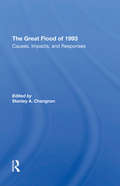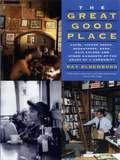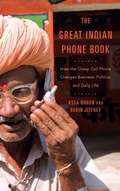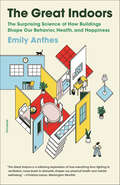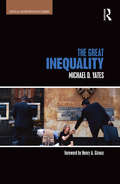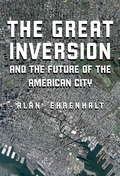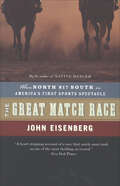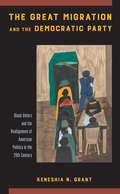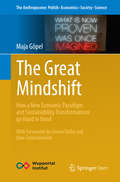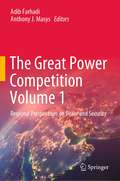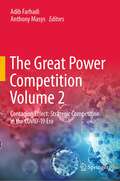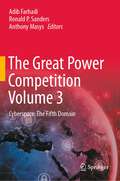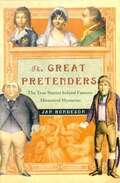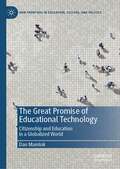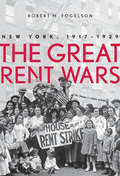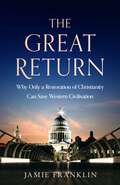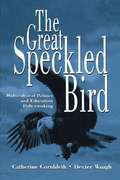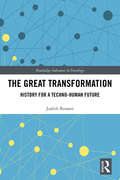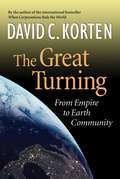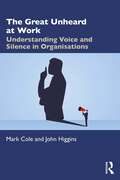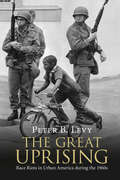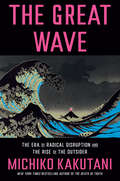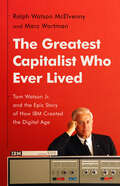- Table View
- List View
The Great Flood Of 1993: Causes, Impacts, And Responses
by Stanley ChangnonThe flood that affected a third of the United States during the summer of 1993 was the nation's worst, ranking as a once-in-300-years event. It severely tested national, state, and local systems for managing natural resources and for handling emergencies, illuminating both the strengths and weaknesses in existing methods of preparing for and dealing with massive prolonged flooding. Through detailed case studies, this volume diagnoses the social and economic impacts of the disaster, assessing how resource managers, flood forecasters, public institutions, the private sector, and millions of volunteers responded to it. The first comprehensive evaluation of the 1993 flood, this book examines the way in which floods are forecast and monitored, the effectiveness of existing recovery processes, and how the nation manages its floodplains. The volume concludes with recommendations for the future, in hope of better preparing the country for the next flood or other comparable disaster.
The Great Good Place: Cafes, Coffee Shops, Bookstores, Bars, Hair Salons, and Other Hangouts at the Heart of a Community
by Ray OldenburgThe Great Good Place argues that third places - where people can gather, put aside the concerns of work and home, and hang out simply for the pleasures of good company and lively conversation - are the heart of a community's social vitality and the grassroots of democracy.
The Great Indian Phone Book: How the Cheap Cell Phone Changes Business, Politics, and Daily Life
by Assa Doron Robin JeffreyIn 2001, India had 4 million cell phone subscribers. Ten years later, that number had exploded to more than 750 million. Over just a decade, the mobile phone was transformed from a rare and unwieldy instrument to a palm-sized, affordable staple, taken for granted by poor fishermen in Kerala and affluent entrepreneurs in Mumbai alike. The Great Indian Phone Book investigates the social revolution ignited by what may be the most significant communications device in history, one which has disrupted more people and relationships than the printing press, wristwatch, automobile, or railways, though it has qualities of all four. In this fast-paced study, Assa Doron and Robin Jeffrey explore the whole ecosystem of the cheap mobile phone. Blending journalistic immediacy with years of field-research experience in India, they portray the capitalists and bureaucrats who control the cellular infrastructure and wrestle over bandwidth rights, the marketers and technicians who bring mobile phones to the masses, and the often poor, village-bound users who adapt these addictive and sometimes troublesome devices to their daily lives. Examining the challenges cell phones pose to a hierarchy-bound country, the authors argue that in India, where caste and gender restrictions have defined power for generations, the disruptive potential of mobile phones is even greater than elsewhere. The Great Indian Phone Book is a rigorously researched, multidimensional tale of what can happen when a powerful and readily available technology is placed in the hands of a large, still predominantly poor population.
The Great Indoors: The Surprising Science of How Buildings Shape Our Behavior, Health, and Happiness
by Emily AnthesAn Architectural Record Notable BookA fascinating, thought-provoking journey into our built environmentModern humans are an indoor species. We spend 90 percent of our time inside, shuttling between homes and offices, schools and stores, restaurants and gyms. And yet, in many ways, the indoor world remains unexplored territory. For all the time we spend inside buildings, we rarely stop to consider: How do these spaces affect our mental and physical well-being? Our thoughts, feelings, and behaviors? Our productivity, performance, and relationships?In this wide-ranging, character-driven book, science journalist Emily Anthes takes us on an adventure into the buildings in which we spend our days, exploring the profound, and sometimes unexpected, ways that they shape our lives. Drawing on cutting-edge research, she probes the pain-killing power of a well-placed window and examines how the right office layout can expand our social networks. She investigates how room temperature regulates our cognitive performance, how the microbes hiding in our homes influence our immune systems, and how cafeteria design affects what—and how much—we eat.Along the way, Anthes takes readers into an operating room designed to minimize medical errors, a school designed to boost students’ physical fitness, and a prison designed to support inmates’ psychological needs. And she previews the homes of the future, from the high-tech houses that could monitor our health to the 3D-printed structures that might allow us to live on the Moon.The Great Indoors provides a fresh perspective on our most familiar surroundings and a new understanding of the power of architecture and design. It's an argument for thoughtful interventions into the built environment and a story about how to build a better world—one room at a time.
The Great Inequality (Critical Interventions)
by Michael D YatesA growing inequality in income and wealth marks modern capitalism, and it negatively affects nearly every aspect of our lives, especially those of the working class. It is and will continue to be the central issue of politics in almost every nation on earth. In this book, the author explains inequality in clear, passionate, and intelligent prose: what it is, why it matters, how it affects us, what its underlying causes are, and what we might do about it. This book was written to encourage informed radical action by working people, the unemployed, and the poor, uniquely blending the author’s own experiences with his ability to make complex issues comprehensible to a mass audience. This book will be excellent for courses in a variety of disciplines, and it will be useful to activists and the general reading public.
The Great Inversion and the Future of the American City
by Alan EhrenhaltIn The Great Inversion and the Future of the American City we travel the nation with Alan Ehrenhalt, one of our leading urbanists, as he explains how America's cities are changing, what makes them succeed or fail, and what this means for our future. Just a couple of decades ago, we took it for granted that inner cities were the preserve of immigrants and the poor, and that suburbs were the chosen destination of those who could afford them. Today, a demographic inversion is taking place: Central cities increasingly are where the affluent want to live, while suburbs are becoming home to poorer people and those who come to America from other parts of the world. Highly educated members of the emerging millennial generation are showing a decided preference for urban life and are being joined in many places by a new class of affluent retirees. Ehrenhalt shows us how the commercial canyons of lower Manhattan are becoming residential neighborhoods, and how mass transit has revitalized inner-city communities in Chicago and Brooklyn. He explains why car-dominated cities like Phoenix and Charlotte have sought to build twenty-first-century downtowns from scratch, while sprawling postwar suburbs are seeking to attract young people with their own form of urbanized experience. The Great Inversion is an eye-opening and thoroughly engaging look at our urban society and its future.From the Hardcover edition.
The Great Match Race: When North Met South in America's First Sports Spectacle
by John EisenbergThe Great Match Race is a captivating account of America's first sports spectacle, a horse race that pitted North against South in three grueling heats. On a bright afternoon in May 1823, an unprecedented sixty thousand people showed up to watch two horses run the equivalent of nine Kentucky Derbys in a few hours' time. Eclipse was the majestic champion representing the North, and Henry, an equine arriviste, was the pride of the South. Their match race would come to represent a watershed moment in American history, crystallizing the differences that so fundamentally divided the country. The renowned sportswriter John Eisenberg captures all the pulse-pounding drama and behind-the-scenes tensions in a page-turning mix of history, horse racing, and pure entertainment.
The Great Migration and the Democratic Party: Black Voters and the Realignment of American Politics in the 20th Century
by Keneshia N. GrantWhere Black people live has long been an important determinant of their ability to participate in political processes. The Great Migration significantly changed the way Democratic Party elites interacted with Black communities in northern cities, Detroit, New York, and Chicago. Many white Democratic politicians came to believe the growing pool of Black voters could help them reach their electoral goals—and these politicians often changed their campaign strategies and positions to secure Black support. Furthermore, Black migrants were able to participate in politics because there were fewer barriers to Black political participations outside the South. The Great Migration and the Democratic Party frames the Great Migration as an important economic and social event that also had serious political consequences. Keneshia Grant created one of the first listings of Black elected officials that classifies them based on their status as participants in the Great Migration. She also describes some of the policy/political concerns of the migrants. The Great Migration and the Democratic Party lays the groundwork for ways of thinking about the contemporary impact of Black migration on American politics.
The Great Mindshift: How a New Economic Paradigm and Sustainability Transformations go Hand in Hand (The Anthropocene: Politik—Economics—Society—Science #2)
by Maja GöpelThis book describes the path ahead. It combines system transformation researchwith political economy and change leadership insights when discussing the needfor a great mindshift in how human wellbeing, economic prosperity and healthyecosystems are understood if the Great Transformations ahead are to lead to moresustainability. It shows that history is made by purposefully acting humans andintroduces transformative literacy as a key skill in leading the radical incremental change
The Great Power Competition Volume 1: Regional Perspectives on Peace and Security
by Anthony J. Masys Adib FarhadiOver the past decade, the international political system has come to be characterized as a Great Power Competition in which multiple would-be hegemons compete for power and influence. Instead of a global climate of unchallenged United States dominance, revisionist powers, notably China and Russia alongside other regional powers, are vying for dominance through political, military, and economic means. A critical battleground in the Great Power Competition is the Middle East, the Horn of Africa, and the Central Asia South Asia (CASA), also known as the Central Region.With the planned withdrawal of U.S. military forces from Afghanistan, the U.S. has stated its intention of shifting attention away from the CASA Region in favor of a more isolationist foreign policy approach. This book provides an in-depth understanding of the implications for this shift related to regional diplomacy & politics, economic opportunities & rivalries, security considerations & interests, and the information environment. Amplifying the vital importance of success in the Central Region to U.S. prosperity and security, this volume advances dialogue in identifying key issues for stakeholders within and beyond the Central Region to gain a holistic perspective that better informs decision-making at various levels.This collection of work comes from scholars, strategic thinkers, and subject matter experts who participated in the Great Power Competition Conference hosted by the University of South Florida, in partnership with the National Defense University Near East South Asia Center for Strategic Strategies in January 2020.
The Great Power Competition Volume 2: Contagion Effect: Strategic Competition in the COVID-19 Era
by Anthony Masys Adib FarhadiEven before the outbreak of the COVID-19 pandemic, the Central Region faced numerous obstacles to building a stable and prosperous future. The region, which encompasses the Middle East, the Horn of Africa, Central Asia, and South Asia, has been plagued by economic and political uncertainty amidst dramatic shifts in the global power structure. With the pandemic now exacerbating the volatility in this already fragile region, the U.S.'s strategic objectives are rife for re-examination.A complicated stew of factors such as weakening of established governance systems, the emboldening of extremist individuals and groups through advances in digital technology, the humanitarian crises in Afghanistan and Syria, and the intensification of the great power competition with China and Russia are creating a fertile environment for the growth of violent extremist organizations (VEOs). Such organizations take advantage of vulnerable, aggrieved, and traumatized populations to fuel radicalization, recruitment, and unrest, which further undermine stability and the potential for peace and prosperity.While it is still early to fully understand how the ongoing response to the COVID-19 pandemic will impact U.S. policy, this book provides a timely analysis of relevant dynamics such as popular radicalization, digital information ecosystems, networks of influence, and new capabilities to recognize and prepare for other such black swan events in the region.
The Great Power Competition Volume 3: Cyberspace: The Fifth Domain
by Ronald P. Sanders Anthony Masys Adib FarhadiFor millennia, humans waged war on land and sea. The 20th century opened the skies and the stars, introducing air and space as warfare domains. Now, the 21st century has revealed perhaps the most insidious domain of all: cyberspace, the fifth domain. A realm free of physical boundaries, cyberspace lies at the intersection of technology and psychology, where one cannot see one’s enemy, and the most potent weapon is information.The third book in the Great Power Competition series, Cyberspace: The Fifth Domain, explores the emergence of cyberspace as a vector for espionage, sabotage, crime, and war. It examines how cyberspace rapidly evolved from a novelty to a weapon capable of influencing global economics and overthrowing regimes, wielded by nation-states and religious ideologies to stunning effect.Cyberspace: The Fifth Domain offers a candid look at the United States’ role in cyberspace, offering realistic prescriptions for responding to international cyber threats on the tactical, strategic, and doctrinal levels, answering the questions of how can we respond to these threats versus how should we respond? What are the obstacles to and consequences of strategic and tactical response options? What technological solutions are on the horizon? Should the U.S. adopt a more multi-domain offensive posture that eschews the dominant “cyber vs. cyber” paradigm? To answer these questions, experts examine the technological threats to critical infrastructure; cyber operations strategy, tactics, and doctrine; information influence operations; the weaponization of social media; and much more.
The Great Pretenders: True Stories Behind Famous Historical Mysteries
by Jan BondesonJAN BONDESON, M.D. focuses his medical expertise and his inciteful wit on the great unsolved mysteries of disputed identity of the last two hundred years. Did the son of Louis Xvi and Marie Antoinette die during his imprisonment in the Temple Tower, or was he one of the people claiming to be the Lost Dauphin after the Terror ended? What does DNA testing on the heart proported to belong to the Dauphin reveal? Was Kaspar Hauser, the mysterious boy who claimed to have spent his entire childhood in a subterranean dungeon, really the Crown Prince of Baden, or was he suffering from pseudologia fantastica, a pathological desire to deceive other people? And when an eccentric and reclusive duke built a complete set of tunnels and rooms beneath his country estate, who is to say that he also didn't have a second life as a shopkeeper with a separate family in London? In this highly anticipated work covering the most famous unsolved cases of disputed identity, Jan Bondeson uncovers all the evidence, then applies his medical knowledge and logical thinking to ascertain the true stories behind these fascinating histories. JAN bondeson, M.D., professor at University of Wales College of Medicine, Cardiff, is the author of Buried Alive, A Cabinet of Medical Curiosities, The Feejee Mermaid, The Two-Headed Boy, and The London Monster, among other works.
The Great Promise of Educational Technology: Citizenship and Education in a Globalized World (New Frontiers in Education, Culture, and Politics)
by Dan MamlokThis book critically looks at the tensions between the promise to transform education through the use of digital technology and the tendency to utilize digital technology in instrumental and technical ways. The widespread use of digital technology has had a remarkable effect on almost every domain of human life. This technological change has caused governments, educational departments, and non-governmental organizations (NGOs) to recognize the need to develop educational plans that would support the social and the cultural changes that have occurred with the ubiquitous permeation of digital technology into our everyday lives. This book challenges common assumptions regarding digital technology and education, through critical exploration of educational policies, interviews, and class observations in the US and Israel. In doing so, the author sheds light on the possibilities of advancing digital citizenship under current educational policies.
The Great Rent Wars
by Robert M. FogelsonWritten by one of the country’s foremost urban historians, The Great Rent Wars tells the fascinating but little-known story of the battles between landlords and tenants in the nation’s largest city from 1917 through 1929. These conflicts were triggered by the post-war housing shortage, which prompted landlords to raise rents, drove tenants to go on rent strikes, and spurred the state legislature, a conservative body dominated by upstate Republicans, to impose rent control in New York, a radical and unprecedented step that transformed landlord-tenant relations. The Great Rent Wars traces the tumultuous history of rent control in New York from its inception to its expiration as it unfolded in New York, Albany, and Washington, D. C. At the heart of this story are such memorable figures as Al Smith, Fiorello H. La Guardia, and Oliver Wendell Holmes, as well as a host of tenants, landlords, judges, and politicians who have long been forgotten. Fogelson also explores the heated debates over landlord-tenant law, housing policy, and other issues that are as controversial today as they were a century ago.
The Great Return
by Jamie FranklinThe decline in Secular Western morality can only be halted and reversed by a full return to Christianity.Many people have a sense that the Western World is in decline and that our society is fragmenting around us. Many people have an ominous sense that we are living at the end of a civilised age and are moving into something far less pleasant and humane. But fewer people understand why this is happening. In this new book, Jamie Franklin argues that the reason for this decline is because we have jettisoned the underlying belief system that gave birth to the Western world - and the Western mind - in the first place: Christianity. He argues that there is a logical and inevitable link between the decline of Christianity and the decline of the West. As our metaphysical commitment to Christianity declines, so does our commitment to the benefits that came to us from Christianity. Through captivating argument, he demonstrates how this plays out in the scientific realm, which has abandoned objectivity for dogmatism; in the ethical realm, which is eliminating humanity from its own formulations; and in the political scene, as it moves away from the democratic principle towards a neo-marxist influenced, nihilistic technocracy that threatens to eliminate human culture, distinctiveness and agency in the pursuit of a globalist utopia. In so doing, Franklin touches on contemporary political conversations that are exercising the public imagination such as abortion, euthanasia, transhumanism, and the rebirth of the totalitarian impulse in Western democracies. Only a revival of Christianity can reverse these trends. This book urges the Church to take seriously its own commitment to the metaphysical and ethical presuppositions of its own faith. But also acknowledges the great challenge that Christianity faces as it threatens to be overwhelmed by the rising tide of secular nihilism that may yet engulf the Western World.
The Great Return
by Jamie FranklinThe decline in Secular Western morality can only be halted and reversed by a full return to Christianity.Many people have a sense that the Western World is in decline and that our society is fragmenting around us. Many people have an ominous sense that we are living at the end of a civilised age and are moving into something far less pleasant and humane. But fewer people understand why this is happening. In this new book, Jamie Franklin argues that the reason for this decline is because we have jettisoned the underlying belief system that gave birth to the Western world - and the Western mind - in the first place: Christianity. He argues that there is a logical and inevitable link between the decline of Christianity and the decline of the West. As our metaphysical commitment to Christianity declines, so does our commitment to the benefits that came to us from Christianity. Through captivating argument, he demonstrates how this plays out in the scientific realm, which has abandoned objectivity for dogmatism; in the ethical realm, which is eliminating humanity from its own formulations; and in the political scene, as it moves away from the democratic principle towards a neo-marxist influenced, nihilistic technocracy that threatens to eliminate human culture, distinctiveness and agency in the pursuit of a globalist utopia. In so doing, Franklin touches on contemporary political conversations that are exercising the public imagination such as abortion, euthanasia, transhumanism, and the rebirth of the totalitarian impulse in Western democracies. Only a revival of Christianity can reverse these trends. This book urges the Church to take seriously its own commitment to the metaphysical and ethical presuppositions of its own faith. But also acknowledges the great challenge that Christianity faces as it threatens to be overwhelmed by the rising tide of secular nihilism that may yet engulf the Western World.
The Great Speckled Bird: Multicultural Politics and Education Policymaking
by Catherine Cornbleth Dexter WaughThis unique volume takes readers behind the scenes for an "insider/outsider" view of education policymaking in action. Two state-level case studies of social studies curriculum reform and textbook policy (California and New York) illustrate how curriculum decision making becomes an arena in which battles are fought over national values and priorities. Written by a New York education professor and a California journalist, the text offers a rare blend of academic and journalistic voices. The "great speckled bird" is the authors' counter-symbol to the bald eagle--a metaphor representing the racial-ethnic-cultural diversity that has characterized the U.S. since its beginnings and the multicultural reality of American society today. The text breaks new ground by focusing on the intersections of national debates and education policymaking. It situates the case studies within historical and contemporary cultural contexts--with particular attention to questions of power and knowledge control and how influence is exercised. By juxtaposing the contrasting cases of California and New York, the authors illustrate commonalities and differences in education policymaking goals and processes. By sharing stories of participants at and behind the scenes, policymaking comes alive rather than appearing to result from impersonal "forces" or "factors."
The Great Transformation: History for a Techno-Human Future (Routledge Advances in Sociology)
by Judith BessantWhile artificial intelligence (AI), robots, bio-technologies and digital media are transforming work, culture, and social life, there is little understanding of or agreement about the scope and significance of this change. This new interpretation of the ‘great transformation’ uses history and evolutionary theory to highlight the momentous shift in human consciousness taking place. Only by learning from recent crises and rejecting technological determinism will governments and communities redesign social arrangements that ensure we all benefit from the new and emerging technologies. The book documents the transformations under way in financial markets, entertainment, and medicine, affecting all aspects of work and social life. It draws on historical sociology and co-evolutionary theory arguing that the radical evolution of human consciousness and social life now under way is comparable with, if not greater than, the agrarian revolution (10000 BCE), the explosion of science, philosophy, and religion in the Axial Age (600 BCE), and the recent Industrial Revolution. Turning to recent major socio-economic crisis, and asking what can be learnt from them, the answer is we cannot afford this time around to repeat the failures of elites and theoretical systems such as economics to attend appropriately to radical change. We need to think beyond the constraints of determinist and reductionist explanations and embrace the idea of deep freedom. This book will appeal to educators, social scientists, policy-makers, business leaders, and students. It concludes with social design principles that can inform deliberative processes and new social arrangements that ensure everyone benefits from the affordances of the new and emerging technologies.
The Great Transition
by Bruce CampbellIn the fourteenth century the Old World witnessed a series of profound and abrupt changes in the trajectory of long-established historical trends. Transcontinental networks of exchange fractured and an era of economic contraction and demographic decline dawned from which Latin Christendom would not begin to emerge until its voyages of discovery at the end of the fifteenth century. In a major new study of this 'Great Transition', Bruce Campbell assesses the contributions of commercial recession, war, climate change, and eruption of the Black Death to a far-reaching reversal of fortunes from which no part of Eurasia was spared. The book synthesises a wealth of new historical, palaeo-ecological and biological evidence, including estimates of national income, reconstructions of past climates, and genetic analysis of DNA extracted from the teeth of plague victims, to provide a fresh account of the creation, collapse and realignment of Western Europe's late medieval commercial economy.
The Great Turning: From Empire to Earth Community (Bk. Currents Ser.)
by David C. KortenDavid Korten’s classic bestseller When Corporations Rule the World was one of the first books to articulate the destructive and oppressive nature of the global corporate economy. In The Great Turning he argues that corporate consolidation of power is merely one manifestation of what he calls “Empire”: the organization of society through hierarchy and violence that has largely held sway for the past 5,000 years. The Great Turning traces the evolution of Empire from ancient times to the present day but also tells the parallel story of the attempt to develop a democratic alternative to Empire, beginning in Athens and continuing with the founding of the United States of America—although elitists with an imperial agenda have consistently sought to undermine the bold and inspiring “American experiment.” Finally, Korten draws on evidence from sources as varied as evolutionary theory, developmental psychology, and religious teachings to make the case that “Earth Community”—a life-centered, egalitarian, sustainable alternative to Empire based on democratic principles of partnership—is indeed possible. And he outlines a grassroots strategy for beginning the momentous turning toward a future of as-yet-unrealized human potential.
The Great Unheard at Work: Understanding Voice and Silence in Organisations
by John Higgins Mark ColeSilence always has something to say – it’s never neutral and speaks volumes if people are willing to hear. Our response to silence is often to dismiss or end it, to block it out with noise. Instead, silence needs to be taken seriously. This book explores the importance of understanding silence and shows how we can move from merely listening to truly hearing those around us. The interplay of voice and silence in organisational life is not straightforward. We can feel pressured to speak and compelled to keep our silence. Knowing how to read silence, to make sense of its generative and degenerative capacity, is a rarely developed skill among managers and leaders at all levels – who have been brought up to see silence as evidence of compliance or a weakness to be addressed. But it is a critical skill for managers and employees alike. Written by two experts in organisational development, this book explores different types of silence and their implications for organisational practice, digging into the theoretical roots and engaging with real stories and voices. It provides everyone at work with an understanding of the different meanings of silence and how to engage well with it. When to stay with it, when to join in with it, and when to be struck by what’s not being said and do something about it. The Great Unheard at Work is essential reading for corporate leaders, HR professionals in all sectors, business students, professionals, and anyone interested in leadership development.
The Great Uprising: Race Riots in Urban America during the 1960s
by Peter B. LevyBetween 1963 and 1972 America experienced over 750 urban revolts. Considered collectively, they comprise what Peter Levy terms a 'Great Uprising'. Levy examines these uprisings over the arc of the entire decade, in various cities across America. He challenges both conservative and liberal interpretations, emphasizing that these riots must be placed within historical context to be properly understood. By focusing on three specific cities as case studies - Cambridge and Baltimore, Maryland, and York, Pennsylvania - Levy demonstrates the impact which these uprisings had on millions of ordinary Americans. He shows how conservatives profited politically by constructing a misleading narrative of their causes, and also suggests that the riots did not represent a sharp break or rupture from the civil rights movement. Finally, Levy presents a cautionary tale by challenging us to consider if the conditions that produced this 'Great Uprising' are still predominant in American culture today.
The Great Wave: The Era of Radical Disruption and the Rise of the Outsider
by Michiko KakutaniAn urgent examination of how disruptive politics, technology, and art are capsizing old assumptions in a great wave of change breaking over today&’s world, creating both opportunity and peril—from the Pulitzer Prize–winning critic and author of the New York Times bestseller The Death of Truth. &“In this dazzling and brilliant book, Michiko Kakutani explains the cascading chaos of our era and points to ways that we can regain some stability.&”—Walter Isaacson, author of Elon MuskThe twenty-first century is experiencing a watershed moment defined by chaos and uncertainty, as one emergency cascades into another, underscoring the larger dynamics of change that are fueling instability across the world. Since the global financial crisis of 2008, people have increasingly lost trust in institutions and elites, while seizing upon new digital tools to sidestep traditional gatekeepers. As a result, powerful new voices—once regarded as radical, unorthodox, or marginal—are disrupting the status quo in politics, business, and culture. Meanwhile, social and economic inequalities are stoking populist rage across the world, toxic partisanship is undermining democratic ideals, and the internet and AI have become high-speed vectors for the spread of misinformation. Writing with a critic&’s understanding of cultural trends and a journalist&’s eye for historical detail, Michiko Kakutani looks at the consequences of these new asymmetries of power. She maps the migration of ideas from the margins to the mainstream and explores the growing influence of outsiders—those who have sown chaos and fear (like Donald Trump), and those who have provided inspirational leadership (like Ukraine&’s president Volodymyr Zelensky). At the same time, she situates today&’s multiplying crises in context with those that defined earlier hinge moments in history, from the waning of the Middle Ages to the transition between the Gilded Age and the Progressive Era at the end of the nineteenth century. Kakutani argues that today&’s crises are not only signs of an interconnected globe&’s profound vulnerabilities, but also stress tests pointing to the essential changes needed to survive this tumultuous era and build a more sustainable future.
The Greatest Capitalist Who Ever Lived: Tom Watson Jr. and the Epic Story of How IBM Created the Digital Age
by Marc Wortman Ralph Watson McElvennyThe enduring story of Thomas Watson Jr.—a figure more important to the creation of the modern world than Rockefeller, Vanderbilt, and Morgan Nearly fifty years into IBM&’s existence, Thomas Watson Jr. undertook the biggest gamble in business history when he &“bet the farm&” on the creation of the IBM System/360, the world&’s first fully integrated and compatible mainframe computer. As CEO, Watson drove a revolution no other company—then or now—would dare, laying the foundation for the digital age that has transformed every society, corporation, and government. The story of Watson being &“present at the creation&” of the digital age is intertwined with near-Shakespearean personal drama. While he put IBM and its employees at risk, Watson also carried out a family-shattering battle over the future of the company with his brother Dick. This titanic struggle between brothers led to Dick&’s death and almost killed Watson Jr. himself. Though he was eventually touted by Fortune magazine as &“the greatest capitalist who ever lived,&” Watson&’s directionless, playboy early years made him an unlikely candidate for corporate titan. How he pulled his life together and, despite personal demons, paved the way for what became a global industry is an epic tale full of drama, inspiration, and valuable lessons in leadership, risk-taking, and social responsibility.
